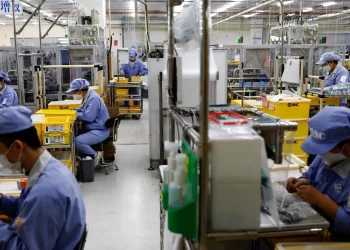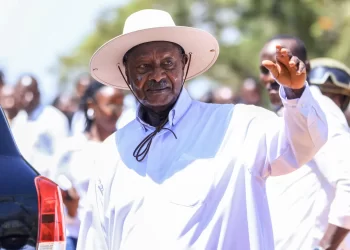The Kofi Annan International Peacekeeping Training Centre (KAIPTC) has graduated 101 students from its postgraduate programmes, with a call for Africans to take greater ownership of the continent’s peace and security agenda in a rapidly changing global order.
The Acting Commandant of the Centre, Air Commodore David A. Akrong, made the call at the 14th Graduation Ceremony held in Accra under the theme “Building African Agency for Peace and Security in a Changing World.”
The graduates comprised 37 students from the MA in Gender, Peace and Security, 63 students from the MA in Conflict, Peace and Security, and one PhD graduate in International Conflict Management.
Prosper Basommi Laari, who earned a CGPA of 3.63, was adjudged the Best Graduating Student in MA Gender, Peace and Security and the Overall Best Student for the 2025 graduating class.
Elizabeth Jennel Acquah, with a CGPA of 3.48, emerged as the Best Graduating Student for MA Conflict, Peace and Security.
The PhD graduate, Mrs. Gifty Yankey Adom, who also served as the Valedictorian, became only the second female doctoral graduate since the inception of the Doctorate programme in 2015.
Air Commodore Akrong commended the graduates for their resilience, discipline, and dedication.
He noted that their hard work reflected the Centre’s vision of producing thought leaders equipped to address Africa’s evolving peace and security challenges.
“Today’s ceremony celebrates your academic excellence and perseverance, but it also marks the beginning of your journey as agents of change.
You are being ushered into a new life—one that demands original and innovative contributions to solving the challenges confronting our continent,” he said.
He reminded the graduates that the ceremony was not the end of their academic journey, but the beginning of greater service to society.
“See this as a stage marking the beginning of a new phase in your life. Africa and the wider world need your ideas, creativity, and courage to build lasting peace and stability,” he stressed.
Building African Agency in Global Peace and Security
Speaking on the significance of the graduation theme, Air Commodore Akrong underscored the need to rethink traditional, Western-centric peace and security frameworks that often marginalise African experiences and priorities.
“Mainstream peace and security scholarship has for too long relegated African states and their insecurities to the margins, treating them as objects rather than subjects of security,” he said.
He explained that KAIPTC’s academic mission seeks to deconstruct and reconstruct global security knowledge to reflect Africa’s realities and shape a more just and equitable world order.
“Our objective is to build African agency—to ensure that African voices, scholarship, and policy drive the solutions to the challenges that confront us,” he added.
The Acting Commandant noted that the Centre’s postgraduate programmes, which began in 2011, have positioned KAIPTC as a world-class institution for research, training, and policy support in African peace and security.
“We are proud that the United Nations, the African Union, ECOWAS, and several African governments continue to call upon KAIPTC to provide specialised training and technical expertise in peace and security,” he said.
Shaping the next generation of peacebuilders
Air Commodore Akrong lauded the faculty, non-teaching staff, and partners of KAIPTC for their dedication to academic excellence and for creating an environment that nurtures innovation and leadership.
He also acknowledged the diverse background of the graduates—from diplomats and security officers to NGO workers and researchers.
He stated that this diversity enriches peace and security discourse and strengthens collaborative problem-solving across Africa.
“These graduates now form part of the critical mass of thinkers and practitioners who will help shape Africa’s peace and security narrative in the emerging multipolar world,” he said.
He urged the new graduates to remain connected to the Centre’s Alumni Network, which spans over 26 countries, and to serve as ambassadors of the institution’s ideals wherever they go.
Vice President’s representative
Speaking on behalf of the Vice President, Professor Jane Naana Opoku-Agyemang, the Chief of Staff at the Office of the Vice President, Mr. Alex Segbefia, reaffirmed the government’s commitment to strengthening Ghana’s peace and security architecture while empowering African institutions to take ownership of the continent’s destiny.
“Africa must no longer see itself as a mere spectator in global affairs but as a proactive and confident actor shaping its own destiny,” he said.
Mr. Segbefia lauded KAIPTC for its pivotal role in promoting peace and stability, describing it as a “beacon of excellence and professional training” that continues to elevate Ghana’s global reputation.
He noted that the government remains committed to supporting the Centre through institutional strengthening and infrastructure development.
“The completion of the KAIPTC complex will expand the Centre’s training capacity, enhance regional collaboration, and reaffirm Ghana’s leadership in international peacekeeping,” he said.
The Chief of Staff also underscored the need for African-led approaches to security and governance, stressing that true peace extends beyond the absence of conflict.
“The cause of peace is not merely political — it is rooted in justice, opportunity, and access,” he remarked.
“We must build societies where every child can learn, every woman can work freely, and every community can thrive without fear.”
He called on the graduates to act with courage and integrity as ambassadors of peace.
He also urged them to uphold the Centre’s legacy and contribute meaningfully to Ghana’s and Africa’s security agenda.












